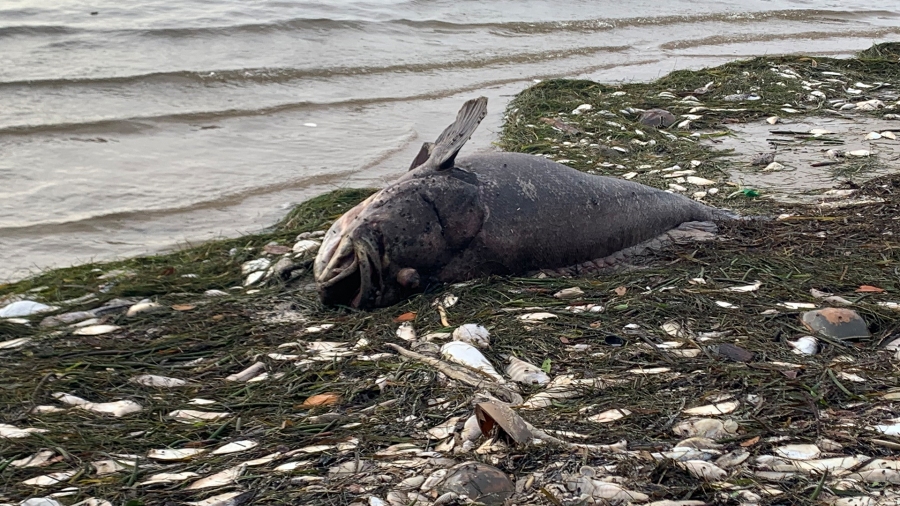SARASOTA COUNTY, Fla. (WFLA) — Can toxic algae from red tide hurt your brain? A Sarasota-based scientific organization, the Roskamp Institute, is studying how the algal blooms may cause neurological diseases. A new study by Roskamp found that red tide exacerbated symptoms in patients with a history of migraines and chronic fatigue.
Red tide is a frequent flyer in different parts of Florida, a state where there are 1,350 miles of coastline. The Florida Fish and Wildlife Conservation Commission tracks red tide, while the Florida Department of Health provides warnings when beaches are unsafe due to algal blooms. What to know about Red Tide The Roskamp study says the blooms occur frequently, and can be “intense and persist over several years.
” Their research is centered on the vulnerability to residents from the brevetoxins released by the algae, Karenia brevis. Brevetoxins are tasteless, odorless neurotoxins which can disrupt normal neurological processes, such as constricting airways, reverse how people feel hot or cold, cause vertigo or a loss of balance, muscle pain, and multiple other conditions related to hand-eye coordination and digestive health. In some cases, people affected by red tide’s toxins can get neurotoxic shellfish poisoning, and upper respiratory tract infections.
An earlier study by the University of Florida found red tide blooms had changed due to human activity. “While red tide blooms develop naturally, we took a long view and found evidence that human activity has helped fuel coastal blooms in this estuary to varying extents between 2012 and 2021,” Miles Medina, lead author of the study and a research scientist at UF’s Center for Coastal Solutions, said in April. Recent infrastructure problems with chemical containment, specifically the leak at the Piney Point phosphogypsum stack in Manatee County, have led to an increase in algal blooms, according to research by UF.
The 2021 discharged water from Piney Point was sent into Tampa Bay. That effort was studied by UF to see if the wastewater had an impact on red tide in the area. The study by the Roskamp Institute doesn’t take a position on how red tide has changed, instead looking at whether or not the presence of red tide can lead to health problems, specifically in the brain.
Florida rads: 3 Tampa Bay counties at higher risk of radon poisoning Roskamp has researched red tide’s impact on the brain since 2019. Their “Red Tide Project” landing page says the institute has studied neurological disorders, mainly dementias like Alzheimer’s Disease. After “several decades of research,” inflammation was identified as a common cause of neurodegenerative diseases.
In that vein, they started studying the releases of brevetoxin from red tide algae. “It is very natural for Institute scientists to turn their attention to a clearly very potent neurotoxic chemical right here in the Sarasota area,” Roskamp says on its Red Tide Project site. ” It has long been known that humans can suffer consequences of Brevetoxin exposure, most commonly in the form of lung and gastrointestinal effects depending on whether the Brevetoxin is inhaled or ingested.
We, at the Roskamp Institute, are particularly interested to learn whether there is a central nervous system (CNS) component to human Brevetoxin exposure. ” The new study, released Tuesday, says they observed impacts on neurological degeneration from the presence of the brevetoxins and red tide blooms. The five southwest Florida counties they studied from June 2019 to August 2021 showed participants had experienced upper respiratory tract symptoms and neurotoxic shellfish poisonings, as well as severe headaches, leading to emergency department visits.
Additionally, “NSP-like symptoms was higher among participants with a PMH of migraines, chronic fatigue syndrome (CFS) and mild memory loss, while the association of headaches with K. brevis blooms was accentuated among individuals with” a history of having migraines. These symptoms were said to be “significant public health safety concerns,” especially among populations with preexisting neurological conditions.
Part of the issue of red tide is that the toxins can be both inhaled and eaten, due to marine life absorbing the chemicals in the water, and the water aerosolizing through evaporation and other weather conditions. Hillsborough among top counties in Florida for STDs, health data shows Speaking with Suncoast News Network, the lead author of the Roskamp study, Dr. Leila Abdullah, said the symptoms caused by aerosolized toxins were similar to eating contaminated seafood, even among those who did not consume those foods.
Floridians can check their local beaches at the FWC’s Red Tide Status site. Currently, no red tide samples have been observed statewide, and no fish kills have been reported. .
From: wfla
URL: https://www.wfla.com/news/sarasota-county/can-red-tide-toxins-cause-brain-disease-sarasota-institute-checking/



